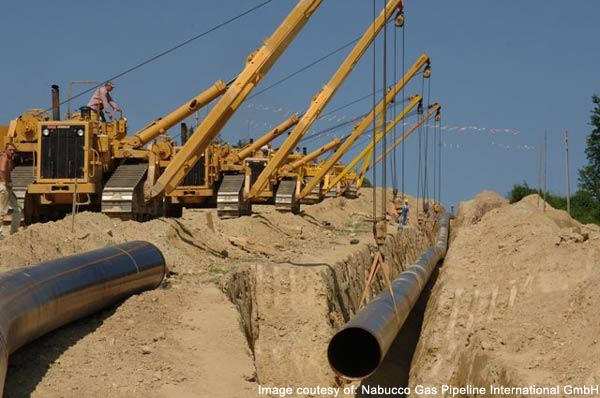
Three Pipeline Consortiums Compete Over Access to Azerbaijan Gas
Publication: Eurasia Daily Monitor Volume: 8 Issue: 160
By:

Three pipeline project consortiums (Nabucco, ITGI, and TAP) compete against each other over priority access to gas production in Azerbaijan. The transporters’ contest is now intensifying as the deadline draws near for submitting proposals to the gas producers’ consortium in Azerbaijan.
Although their respective merits are far from equal, the three projects are involved in a zero-sum contest for transporting the gas production from Azerbaijan’s Shah Deniz field to European Union territory. While Nabucco is ultimately headed for central Europe, the ITGI (Interconnector Turkey-Greece-Italy) and TAP (Trans-Adriatic pipeline from Albania to Italy, in continuation of a Turkey-Greece route) are each headed for southeastern Italy. Although Nabucco looks to Azerbaijan for sourcing this pipeline’s first stage (8 billion cubic meters (bcm) to 10 bcm annually, before reaching the planned 31 bcm per year), ITGI and TAP depend entirely on Azerbaijani gas to fill their capacities at only 10 bcm per year each.
Azerbaijan’s State Oil Company has asked all three gas transportation consortiums to submit definitive proposals by October 1. This deadline had been set last year, and the request is an earnest reminder that Azerbaijan and the other producers intend to speed up the choice of a transportation solution. That choice would in turn accelerate the investment decision for fully-fledged gas production at the Shah Deniz field (www.news.az, August 11).
The official letter asks ITGI, TAP, and Nabucco (listed in this order in the press release) to provide conclusive information about technical parameters, construction schedules and costs, and transit regimes and tariffs of their respective pipeline projects, as well as gas pricing issues. On that basis, the gas producers will evaluate the three competing pipeline projects, and select one of them for transporting the entire gas volume earmarked for Europe. The criteria seem purely commercial and corporate. The producers’ consortium does not seem to factor in the European strategic priorities, at least not officially or publicly, at this stage.
The Shah Deniz producers’ consortium includes British Petroleum (operator) and Norway’s Statoil with 25.5 percent of the shares each; Azerbaijan’s State Oil Company, Total of France, Russian Lukoil, and Naftiran (commercial subsidiary of Iran’s National Oil Company) with 10 percent each; and Turkish Petroleum with 9 percent. Azerbaijan’s company has been designated to lead the group negotiating with the transporters’ consortiums on behalf of the Shah Deniz producers.
That same consortium in the same composition owns the South Caucasus Pipeline, running through Azerbaijan and Georgia to the Turkish border (with a Turkish continuation to Erzurum). Dedicated to Shah Deniz production, the pipeline has an initial capacity of 9 bcm per year (under-utilized in 2009-2011 at an average annual rate of 5 bcm – Trend, August 11, 16) and is slated for capacity expansion up to 20 bcm per year, to accommodate full-scale deliveries from Shah Deniz and potentially other sources. The Nabucco, ITGI, and TAP pipeline projects each propose to link up with the South Caucasus pipeline on Turkish territory.
Production at Shah Deniz, currently in Phase One at 9 billion cubic meters (bcm) annually, is planned to increase by 16 bcm per year with Phase Two of Production starting in 2017, for an annual total of 25 bcm. Phase One volumes as well as 8 bcm from Phase Two volumes are already earmarked for non-EU consumers (mainly Turkey, with 6.6 bcm annually from first phase and 6 bcm per year from second phase). This would leave 10 bcm per year from Phase Two of Shah Deniz gas available for export to Europe via one of the three competing pipeline projects.
Total gas production in Azerbaijan is poised to continue rising beyond 30 bcm per year after 2011, from currently operating gas fields with proven reserves (not including some 4 bcm per year that Azerbaijan’s State Oil company currently obtains from oil fields). It seems unproblematic to increase the gas volumes exportable to Europe by adding small volumes from fields other than Shah Deniz. However, the bulk of production from those other fields will have to meet Azerbaijan’s growing internal demand and its diversifying export commitments. With gas as with oil, Azerbaijan avoids overdependence on a single export direction. The western direction is the main vector, but some small volumes are also being delivered via existing pipelines to Russia and Iran.
Investment in Shah Deniz Phase Two is expected to exceed $20 billion for the project’s 20-year lifetime. The investment decision largely depends on the comparative assessment of the three transportation solutions. The producers’ consortium wants to expedite that assessment and that decision.
Azerbaijan holds the decisive cards in negotiations with the three competing pipeline consortiums. Baku’s official position is to assess Nabucco, ITGI, and TAP “pragmatically” (i.e., ruling out political considerations) on a commercial basis. Apart from pricing, Baku has identified some additional criteria for its upcoming decision. Azerbaijan wants to become a shareholder in the pipeline consortium that will be chosen from among the three rivals. It wants that pipeline to be fully utilized with commercially guaranteed sources of supply (under-utilization would result in excessively high transportation tariffs). Baku does not want to have to subsidize an under-utilized pipeline; nor would it pay for building pipeline capacities that might turn out to be redundant.
These risks would seem to affect primarily the Nabucco project, given its planned annual capacity of 31 bcm, triple that of either of its rivals. However, only Nabucco (not its rivals) would enable Azerbaijan to become a transit country for Central Asian gas to Europe – a role that Azerbaijan seeks to add to its producer role. The European Commission shares Azerbaijan’s interest in avoiding such risks to Nabucco, and enable Azerbaijan to function also as a transit country by firming up supply commitments from Turkmenistan. Toward that end, the commission plans to hold trilateral negotiations, EU-Azerbaijan-Turkmenistan, as soon as September, ahead of the October 1 deadline for the pipeline consortiums to submit their competitive offers to Baku.




